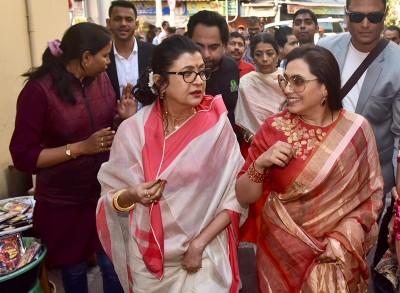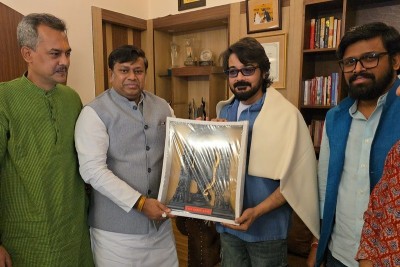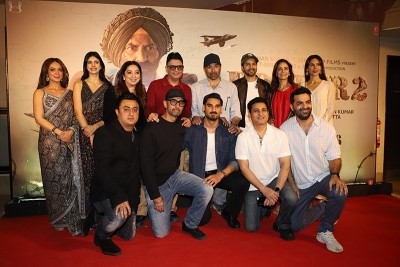February 18, 2026 08:17 am (IST)
Kaun Kitne Paani Mein to premiere at World Water Summit, Korea
Mumbai, Mar 22 (IBNS): 'Kaun Kitne Paani Mein', a film on the biggest issue facing mankind in the coming years-water-will now premiere at the 7th World Water Forum, taking place at Daegu, Korea between April 13-17.
This is the world biggest world water summit and the film directed by National
Award winner Nila Madhab Panda of I am Kalam and Jalpari fame stars Saurabh Shukla, Gulshan Groverm Kunal Kapoor and Radhika Apte in stellar roles.
The film has been produced by the international NGO – One Drop Foundation.
Kaun Kitne Paani Mein aims at raising awareness about the issue of water and sanitation in India’s rural areas where 70% of the population lives and where the problem is most pressing and is a story about two villages, Upri and Bairi. Upri is a village nestled in the hills and Bairi is at the base of the Hill Range although close to each other in proximity, are poles apart in every other measure as of
water access and economic development.
The people of Upri were like royalty and they had used the people of Bairi as their employees. This had made the people of Bairi skilled in their work and also become good farmers. The people of Upri who assumed these good times would
remain never planned for a rainy day and lived a rich life splurging on all the resources.
But in 1992, as a result of a love quarrel between a young girl from Upri and a young man from Bari, the villagers of Upri excommunicated the inhabitants of Bari. The people of Bairi were devastated since they got employment, food and money from working in Upri. But the village survived. The thing that made them survive was the real knowledge they had in terms of farming, harvesting and building wells while they were working for the rich people from Upri.
Few years later an immense drought hit the area where Upri and Bairiare located. Then the equation of power between the two villages completely changed because of water. Upri, in its heydays, had never truly worried about water as they had ample workforce from Bairi to get water from far. They had splurged the water they had and also eroded the water table by digging a lot of wells. Bairi, on the other hand, had lived frugally and used water sparingly having realized that it was a critical resource.
They had hence planned for water storage, rain harvesting and water table replenishment. After the drought, Bairi had the ability to stock enough water for its needs and Upri, on the other hand,was completely dependent on the Government for water.
This shortage of water had affected Upri in all aspects from agriculture to living. Upri had no toilets and the lands were all barren. Bairi, on the other hand, had access to safe water, good farming capabilities, and also had toilets in each home.
The head of the Upri village had a son Rajesh Singh in his mid-20s who was coming back to the village after his higher education in the nearby city. The people of Upri had pinned all their hopes on Raj and wanted him to sort out the mess of water for them.
The head of the Bairi village has one daughter, Janhavi. Janhavi, the heroine of the story, is a girl very rooted to the cause of water and Bairi. She knows very clearly what made Bairi grow and what made Upri what it is. She is a girl who has no problem speaking her mind. She has an opinion and is also the women’s voice in the Panchayat.
The rest is pure Bollywood movie with love, politics, plot, music and dance.
Nila Madhab Panda’s past two movies “I am Kalam” (2011) and “Desert Mermaid” (2012) were both successful in India and abroad. The highly-acclaimed I Am Kalam has already won 24 International awards, one national award, two Industry awards (FilmFare and Screen) and several nominations, in addition to travelling to over 60 International film festivals.
The movie will be released initially in Hindi. Dubbed versions will be made initially in Odya and Bengali. An English subtitled version will also be released for the international market.
Support Our Journalism
We cannot do without you.. your contribution supports unbiased journalism
IBNS is not driven by any ism- not wokeism, not racism, not skewed secularism, not hyper right-wing or left liberal ideals, nor by any hardline religious beliefs or hyper nationalism. We want to serve you good old objective news, as they are. We do not judge or preach. We let people decide for themselves. We only try to present factual and well-sourced news.
Support objective journalism for a small contribution.
Latest Headlines
Alia Bhatt to present at 79th BAFTA Awards; to join Cillian Murphy, Kate Hudson, among others
Tue, Feb 17 2026
Feb 26 wedding? Viral invite sparks buzz around Vijay Deverakonda, Rashmika Mandanna
Mon, Feb 16 2026
Harvard India Conference: Shashi Tharoor praises Priyanka Chopra for making country proud, actress responds
Mon, Feb 16 2026
O'Romeo thrives on silence and unsaid emotions: Shahid Kapoor; Triptii Dimri calls it a dream come true
Fri, Feb 13 2026
Taapsee Pannu on her hat-trick collaboration with Anubhav Sinha: ‘His films are dramatically real’
Thu, Feb 12 2026
Salman Khan, Ajay Devgn, other industry figures offer support to Rajpal Yadav after he surrenders in jail
Wed, Feb 11 2026







